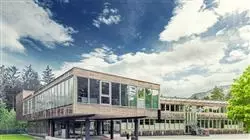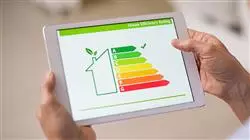University certificate
The world's largest faculty of engineering”
Introduction to the Program
Engineering professionals must continue their training during their career to adapt to new developments in the field"

The Postgraduate diploma in Sustainable Development in the Construction of Buildings addresses the complete range of issues involved in this field, both in the residential and tertiary sectors. Its study has a clear advantage over other programs that focus on specific blocks, which prevents the student from knowing the interrelationship with other areas included in the multidisciplinary field of Sustainable Development in the Construction of Buildings .
By completing and passing the assessments of this specialized program, the student will obtain a solid knowledge of Sustainable Development in the Construction of Buildings .
Throughout these months of specialization, you will learn more about energy consumption and demand, as these are the key factors for a building to be energetically comfortable. You will learn to detect the relationship of a building with human health, as well as to have a comprehensive approach to the circular economy in buildings in order to maintain a strategic vision of implementation and best practices.
In as it is a 100% online Postgraduate diploma, the student is not constrained by fixed timetables or the need to move to another physical location, but can access the contents at any time of the day, balancing their professional or personal life with their academic life.
Do not miss the opportunity to take with us this Postgraduate diploma in Sustainable Development in the Construction of Buildings . It's the perfect opportunity to advance your career"
This Postgraduate diploma in Sustainable Development in the Construction of Buildings contains the most complete and up-to-date program on the market. The most important features include:
- The development of practical cases presented by experts in Sustainable Development in the Construction of Buildings
- The graphic, schematic, and practical contents with which they are created provide scientific and practical information on the disciplines that are essential for professional development
- Practical exercises where the self-assessment process can be carried out to improve learning
- Its special emphasis on innovative methodologies in Sustainable Development in the Construction of Buildings
- Theoretical lessons, questions to the expert, debate forums on controversial topics, and individual reflection work
- Content that is accessible from any fixed or portable device with an Internet connection
This Postgraduate diploma is the best investment you can make when selecting a refresher program to update your existing knowledge in Sustainable Development in the Construction of Buildings ”
Its teaching staff includes professionals belonging to the field of construction, who bring to this program the experience of their work, as well as recognized specialists from leading companies and prestigious universities.
The multimedia content, developed with the latest educational technology, will provide the professional with situated and contextual learning, i.e., a simulated environment that will provide immersive training programmed to train in real situations.
This program is designed around Problem-Based Learning, whereby the professional must try to solve the different professional practice situations that arise throughout the program. For this purpose, the professional will be assisted by an innovative interactive video system created by renowned and experienced experts in Sustainable Development in the Construction of Buildings .
This program comes with the best educational material, providing you with a contextual approach that will facilitate your learning"

This 100% online Postgraduate diploma will allow you to balance your studies with your professional work while expanding your knowledge in this field"
Why study at TECH?
TECH is the world’s largest online university. With an impressive catalog of more than 14,000 university programs available in 11 languages, it is positioned as a leader in employability, with a 99% job placement rate. In addition, it relies on an enormous faculty of more than 6,000 professors of the highest international renown.

Study at the world's largest online university and guarantee your professional success. The future starts at TECH”
The world’s best online university according to FORBES
The prestigious Forbes magazine, specialized in business and finance, has highlighted TECH as “the world's best online university” This is what they have recently stated in an article in their digital edition in which they echo the success story of this institution, “thanks to the academic offer it provides, the selection of its teaching staff, and an innovative learning method aimed at educating the professionals of the future”
A revolutionary study method, a cutting-edge faculty and a practical focus: the key to TECH's success.
The most complete study plans on the university scene
TECH offers the most complete study plans on the university scene, with syllabuses that cover fundamental concepts and, at the same time, the main scientific advances in their specific scientific areas. In addition, these programs are continuously being updated to guarantee students the academic vanguard and the most in-demand professional skills. In this way, the university's qualifications provide its graduates with a significant advantage to propel their careers to success.
TECH offers the most comprehensive and intensive study plans on the current university scene.
A world-class teaching staff
TECH's teaching staff is made up of more than 6,000 professors with the highest international recognition. Professors, researchers and top executives of multinational companies, including Isaiah Covington, performance coach of the Boston Celtics; Magda Romanska, principal investigator at Harvard MetaLAB; Ignacio Wistumba, chairman of the department of translational molecular pathology at MD Anderson Cancer Center; and D.W. Pine, creative director of TIME magazine, among others.
Internationally renowned experts, specialized in different branches of Health, Technology, Communication and Business, form part of the TECH faculty.
A unique learning method
TECH is the first university to use Relearning in all its programs. It is the best online learning methodology, accredited with international teaching quality certifications, provided by prestigious educational agencies. In addition, this disruptive educational model is complemented with the “Case Method”, thereby setting up a unique online teaching strategy. Innovative teaching resources are also implemented, including detailed videos, infographics and interactive summaries.
TECH combines Relearning and the Case Method in all its university programs to guarantee excellent theoretical and practical learning, studying whenever and wherever you want.
The world's largest online university
TECH is the world’s largest online university. We are the largest educational institution, with the best and widest online educational catalog, one hundred percent online and covering the vast majority of areas of knowledge. We offer a large selection of our own degrees and accredited online undergraduate and postgraduate degrees. In total, more than 14,000 university degrees, in eleven different languages, make us the largest educational largest in the world.
TECH has the world's most extensive catalog of academic and official programs, available in more than 11 languages.
Google Premier Partner
The American technology giant has awarded TECH the Google Google Premier Partner badge. This award, which is only available to 3% of the world's companies, highlights the efficient, flexible and tailored experience that this university provides to students. The recognition as a Google Premier Partner not only accredits the maximum rigor, performance and investment in TECH's digital infrastructures, but also places this university as one of the world's leading technology companies.
Google has positioned TECH in the top 3% of the world's most important technology companies by awarding it its Google Premier Partner badge.
The official online university of the NBA
TECH is the official online university of the NBA. Thanks to our agreement with the biggest league in basketball, we offer our students exclusive university programs, as well as a wide variety of educational resources focused on the business of the league and other areas of the sports industry. Each program is made up of a uniquely designed syllabus and features exceptional guest hosts: professionals with a distinguished sports background who will offer their expertise on the most relevant topics.
TECH has been selected by the NBA, the world's top basketball league, as its official online university.
The top-rated university by its students
Students have positioned TECH as the world's top-rated university on the main review websites, with a highest rating of 4.9 out of 5, obtained from more than 1,000 reviews. These results consolidate TECH as the benchmark university institution at an international level, reflecting the excellence and positive impact of its educational model.” reflecting the excellence and positive impact of its educational model.”
TECH is the world’s top-rated university by its students.
Leaders in employability
TECH has managed to become the leading university in employability. 99% of its students obtain jobs in the academic field they have studied, within one year of completing any of the university's programs. A similar number achieve immediate career enhancement. All this thanks to a study methodology that bases its effectiveness on the acquisition of practical skills, which are absolutely necessary for professional development.
99% of TECH graduates find a job within a year of completing their studies.
Postgraduate Diploma in Sustainable Development in Construction
.
TECH Global University presents the Postgraduate Diploma in Sustainable Development in Construction, an academic program designed for professionals in the construction sector who wish to acquire specialized knowledge in sustainable practices and energy efficiency in building projects. Through our virtual classes and during 6 months, you will become an expert in the development of sustainable and environmentally responsible projects. In this Postgraduate Diploma, you will explore the latest trends and methodologies in sustainable development applied to the building sector. You will learn how to integrate sustainability criteria into all stages of a project, from design and construction to building management and maintenance. Our online learning platform will provide you with access to quality teaching materials, interactive resources and discussion sessions with experts in the field of Sustainable Development in Construction.
Become an expert in Sustainable Development in Construction.
During the Postgraduate Diploma, we will address topics such as the efficient use of natural resources, the reduction of the carbon footprint, the implementation of renewable energies and the application of sustainable regulations and certifications in building. You will also analyze case studies and study best practices to promote energy efficiency, indoor environmental quality and resource optimization in construction projects. Upon completion of the Postgraduate Diploma program, you will receive a Postgraduate Diploma certificate, endorsed by TECH. This official recognition will support your skills and knowledge, giving you a competitive advantage in the job market and the opportunity to contribute to building a more sustainable and responsible future. Don't miss the opportunity to be part of the change towards a more sustainable and environmentally responsible building.







